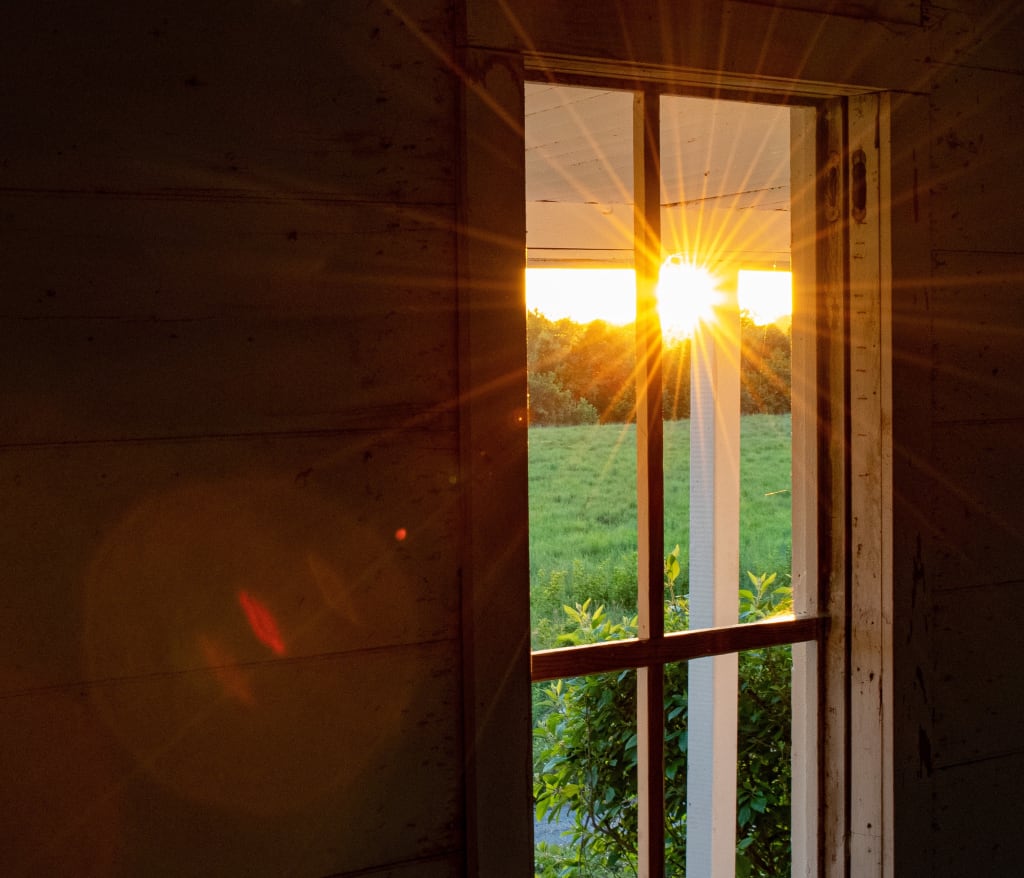When All This Is Over
It’s a decade after the apocalypse but Cat is still afraid to leave her doomsday-prepped home in the isolated Kansas countryside. From the comfort of her routine-driven life, she reflects on what happened and whether it’s finally time to reconnect.

Cat wakes promptly at 7am and reaches to the nightstand for her glass of water. Her fingers briefly graze something slender, smooth, and suddenly mobile before she snatches her hand back and focuses her eyes on the table. They said cockroaches can survive anything – even an apocalypse. The unfortunate reality is that it’s the cockroaches and herself.
Today is the 10-year anniversary of the Big Event, and tonight she will commemorate it with a party. However, this morning begins like every other morning: she removes her protective earplugs and has a glass of water before performing 50-minute combination of meditation and calisthenics in her bedroom facing the trees.
As a girl she loved women’s magazines, especially when they did day-in-a-life diaries. She often still imagined being interviewed about her own daily rituals like the celebrities of yore, offering an aspirational guide for thousands of other women who would hope to master her discipline, imitate her appearance, and replicate her virtue. It was a grandiose fantasy, but she believes she really is an inspiration for these past few years. The idea of being publicly celebrated for it has helped her stay on track. She even has the perfect headline: How to Stay Young and Thrive at 55 – Without a Single Visit to the Doctor or Any Human Contact for Years!
At 8am, she brushes her teeth with baking soda and braids her long silvery gray hair in a single braid down her back. Her day uniform consists of faded blue denim workpants, brown leather steel-toed boots, and a colorful patchwork top. She began deconstructing her wardrobe of tattered cotton shirts and sewing reinforced tops in zany patterns with the scraps as one of her original lockdown hobbies. Years ago, she thought how pleased she would be to share these designs with her friends and family. Perhaps she could start a ‘sustainable’ business selling them in town after it was all over. Maybe, she thought, boutiques in New York or Paris would even be interested in carrying her designs.
Cat’s mornings are spent on farm maintenance. The property is nestled within a dense group of trees at the end of a long and unkept gravel driveway. It is mostly hidden from the dirt roads that connect the vast farmland outside their town. Her world consists entirely of this white house with black shutters, the rustic white barn stockpiled with tools and supplies, and the greenhouse she built herself from two-by-fours and an opaque polythene tarp. On one side, behind a thicket of bamboo, there is a creek with fresh water that, miraculously, never dried up or ran so putrid it couldn’t be collected and filtered.
She puts on her shabby yellow leather gardening gloves and gets to work tending to the greenhouse where the potatoes, peppers, lettuce, squash, and other fresh foods grow. They had cut back on her garden flowers to conserve water after it became clear this homesteading exercise was not a drill, but a means of survival. She kept one row dedicated to her favorite pink rose shrubs. She would tell magazine readers that leaving space for daily indulgences, like fresh cut flowers on the kitchen table, is what makes life worth living.
Now that she’s had time to really think about it, the Big Event was the culmination of many smaller events – the escalating heat, the storms, the sicknesses, and mass deaths that followed. Public infrastructure that crumbled without proper maintenance. Humanity’s collective failure to do anything differently.
She only started calling it the Big Event after a frantic church group leader called it that and the news picked it up: he was certain that this was the Big Event, or the rapture. There was no one around to name it otherwise afterwards.
For her, the change started with a peculiar lack of moisture. The summers in Kansas had always been dry and hot but about 15 years earlier the summer turned especially dry and hot and windy, with the arid ground whipping up around them into dust storms. Smoke from the ever-present wildfires constantly shut down the sleepy two-lane highways that could take them 10 miles into the next town with the Pizza Hut or 56 miles to the nearest Wal-Mart. Rather than relief, the summer breeze felt more like the streams of heat that flood out of a hot oven. But she wondered, did it only seem worse because she was older? Because everything felt a little worse than it did when she was young?
Her husband Frank always said there was no reason to worry. The weather does what it does no matter what people do. There was the Dust Bowl in the ‘30s and people recovered. The economy crashed in the 70s, the 90s, the 00s, and people recovered. Through the fires, the freezing ice storms, the great migrations, the tornado clusters, the diseased livestock he always said, “The only choice we have is to keep going. We’ll recover.” He wanted her to feel safe.
But there were some things better not left to chance, so he suggested they move from the house in town into an old white farmhouse on the land her family had owned for generations. They’d always revered pioneer folklore and escaping the perils of their civilization felt like the modern-day version. It was an adventure – something they’d write books and games about for elementary school children in the future.
The ground was ravaged by decades of cattle grazing and raising commercial crops such as wheat and corn. She began composting and they made plans to restore the soil and grow their own food, although the grocery stores were still open when they first moved out there. Frank researched and consulted with some of his engineering colleagues to build independent power sources, too.
It was novel at first – and they thought it would all be temporary. Cat bought essentials for the farmhouse but her stuff – the bulk of her life – was still back at the house in town. The house on brick road where she meticulously designed each room and hosted dinner parties under the tutelage of her magazines. Jewelry, books, Christmas decorations, photo albums and more lovely little indulgences lay in wait for her there for more than a decade.
At 12pm, she heads into the house and prepares her midday meal: baby potatoes roasted with garlic and herbs in the wood burning oven alongside a fresh spring mix salad from the garden. She always knows what time it is because of the little clock on the inside of her gold heart-shaped locket that dangles from a delicate gold chain around her neck. Frank gave it to her for their 14th wedding anniversary. Opened, one side has a clock, and the other a photo of them in front of a Chicago clock tower on their honeymoon. The inscription on the back reads: “Until the end of time.” She thought it was sweet, if cheesy, then. These days, ‘the end of time’ feels like a threat.
After lunch, she completes various house chores such as sweeping, scrubbing surfaces, and doing her laundry. The late afternoon is reserved for reading on the screened-in sun porch. She selects an old Vanity Fair from the extensive magazine collection she’s still grateful they decided to store at the farmhouse all those years ago. Grateful she never succumbed to the urge to throw them all out in a spring-cleaning frenzy. This issue is from 2005, and the cover features an ethereal Jennifer Anniston sitting breezily with a men’s crisp white button-down shirt draped strategically over her glowing tan skin. The interview is about whether the actor would have or even wanted children. Was she lonely without children?
At 7pm, she changes into her evening outfit: a knee-length black poplin dress with bell sleeves, gold hoop earrings and a single pink rose tucked into her hair. An anniversary should be special, so she puts on her favorite Miles Davis record and opens a bottle of the expensive sparkling white wine Frank stored in the cellar for ‘when all this is over.’ That the virus is gone, and it’s time for the survivors to rebuild a new civilization. The first glass was already making her cry a little, thinking about Frank.
The day he died they’d been arguing about whether to finally go back into town. It had been more than five years at the farm without working telephones, television, internet, or any outside contact. She wanted to go back to their house in town. He argued that it wasn’t safe there and that the cars were broken anyway, and stormed out to the river to collect water. He never wanted to talk anything through or see her side. She stewed in the house for hours, packing a backpack with clothes and dried foods so she could hike the eight miles back home whether he came along or not. Hell, she’d hike the whole Oregon trail until she got to the Pacific Ocean, if it meant never coming back to this damn farm.
With her bag packed, she went to say goodbye but found him collapsed and unresponsive by the water. She tried CPR. She tried splashing his face with water. Nothing. He was dead. She dragged his long, heavy body up the bank and across the yard and buried him in the woods the next day. A musty blanket of guilt and grief hung around her shoulders, weighing her down for months afterwards.
It wasn’t the first time they’d had an argument like that, on the farm or during their marriage.
All their lives they lived in the town where they both were born, raised, and met each other. They married when she was 20 years old, and he was 28 years old. During the week, he worked at an industrial machinery manufacturer from 8am-4:30pm, spent Tuesday evenings at a bowling league, and Thursday evenings playing pool at the only bar in town. On Friday evenings, he took her to the movies in the next town over. Saturdays were reserved for yard work and beers. On Sunday they went to the Methodist church and had lunch at the diner. Repeat ad infinitum.
She’d have periods of what he called her ‘itchy brain.’ She’d want to take a trip to look at real estate in Dallas or devise a plan to sell everything and live a nomadic life in an RV. He’d say no and she’d fire back that he was too content, too boring.
She’d rearrange the furniture in their house just to feel something new and release the pent-up existential tension. Why didn’t he need more like she did?
“The grass is greenest where you water it, Kit-Kat.”
“What if I don’t want grass?” she’d reply.
Then he’d do something like throw them an anniversary party and give her a sentimental heart-shaped locket and she’d snap out of it. She didn’t need more. She didn’t even know what more was.
She pours a second glass of the bubbly wine and changes out the Miles Davis for some Coltrane. The golden light from the sunset floods in through the window, and the sky is awash in a magnificent gradient of vibrant pink, orange, and purple. It must be celebrating, too.
Life was supposed to have a beginning, a middle and an end, but she wonders, did her story even start? Or maybe her story finished with Frank’s death and the fates forgot to cut her thread. She hates when these self-pitying thoughts creep into her mind. She must press forward.
She moves the recliner across the room to face the sunset, and wonders if the earth ever feels like time is lasting too long or if it’s just content to spin around next to the sun every day. Looking out onto wide horizon, she sips her drink and wonders if it’s time to leave all this behind and hike the Oregon Trail or at least the road back into town. Time to find the other survivors, if there are any. Maybe it is, but not tonight. Tonight, she is content to celebrate with the sky.
About the Creator
Enjoyed the story? Support the Creator.
Subscribe for free to receive all their stories in your feed. You could also pledge your support or give them a one-off tip, letting them know you appreciate their work.






Comments
There are no comments for this story
Be the first to respond and start the conversation.